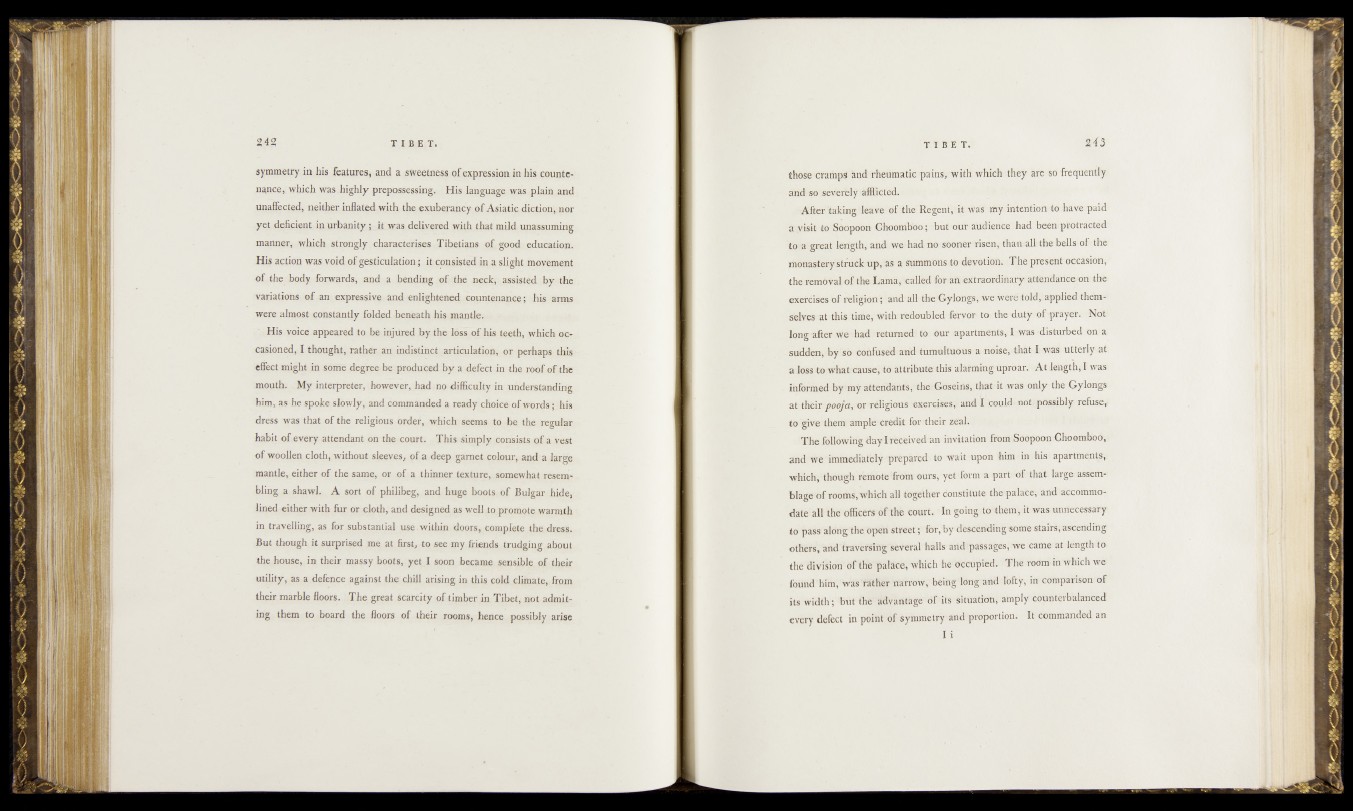
2 4 £ T I B E T .
symmetry in his features, and a sweetness of expression in his countenance,
which washighly prepossessing. His language was plain and
unaffected, neither inflated with the exuberancy of Asiatic diction, nor
yet deficient in urbanity; it was delivered with that mild unassum ing
manner, which strongly characterises Tibetians of good education.
His action was void of ges ticulation; it consisted in a slight movement
of the body forwards, and a bending of the neck, assisted by the
variations of an expressive and enlightened countenance; his arms
were almost constantly folded beneath his mantle.
' His voice appeared to be injured by the loss of his teeth, which occasioned,
I thought, rather an indistinct articulation, or perhaps this
effect might in some degree be produced by a defect in the roof of the
mouth. My interpreter, however, had no difficulty in understanding
him, as he spoke slowly, and commanded a ready choice of words; his
dress was that of the religious order, which seems to be the regular
habit of every attendant on the court. This simply consists of a vest
of woollen cloth, without sleeves, of a deep garnet colour, and a large
mantle, either of the same, or of a thinner texture, somewhat resembling
a shawl. A sort of philibeg, and huge boots of Bulgar hide,
lined either with for or cloth, and designed as well to promote warmth
in travelling, as for substantial use . within doors, complete the dress.
But though it surprised me at first, to see my friends trudging about
the house, in their massy boots, yet I soon became sensible of their
utility, as a defence against the chUI arising in this cold climate, from
their marble floors. The great scarcity of timber in Tibet, not admit-
ing them to board the floors of their rooms, hence possibly arise
T IB E T , 2 f 3
thdseeraihps ‘and'rhenmatitej^ains, with wlicli they are so frequency?
and so sevferfely >affireted.;
•After ’taking leave of the Regent,rit was ifry intehtion to.hawe paid!
a visit to SOopoon Ghooiritfeo; -but'ouratadienee'had beemptotraeted'
to-# .great length, and we had no; s'oon'er%isen, than all1 the bells of the
Monastery struck up, as a summons to devotiton- The present,occasion;-'
therremOval, of the Lama, called- foranieMtFaordfearyattendariGe-on the
exercises of religion; and all the-Gylongsywe Were sSoJdyappKed themselves
at this time, witfr-refioubled -fervor* tor the dutytof prayer.’ Not*
long after We had returned to our apartments, 1 was 'disturbed on*a
. sudden,fby so cdnfoscd and tumultuous• a noise,jj that I was utterly-at
a loss to what cause, to attribute this alarining uproar. At*length, I was
informed by-my attendants,1 the Goseins, that-it was only theGylongs
at their pooja, or -religious •exereised*and I couldnot possibly refuse*
to give them ample Credit' for rtbeir zeal.
The following dayltbceived an irritation ftom SoOpoon Ghoomhbo,»
atnd We immediately 'prepared to wait upon him -in^his’ apartments,
which, though retnote !from ours, yet dorm a part o f that, large assemblage'Of
rooms, which all together constitute thepalace; and'.accommodate
all the officers of the court. In going to ’them, it was unnecessary
to pass along the. apeit street; fOryby descending some stairs, ascending
others, and traversing several halls arid'tpassages; we came at length to.
the division of the palsice, which he Occupied. The room’in which we
found 'him, was father riatfoW, being lOng and lofty, in comparison of
its width; but the advantage of1 its situation, amply counterbalanced
every defect in point of symmetry and proportion. It commanded an
I i